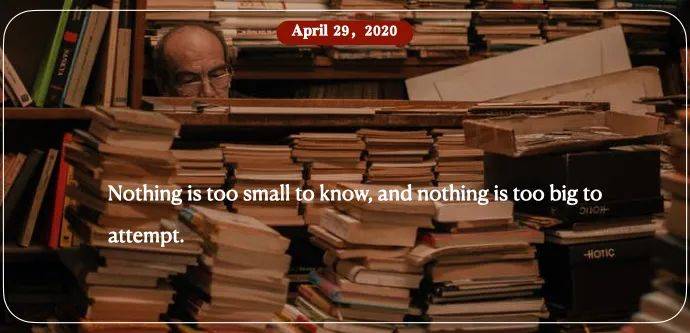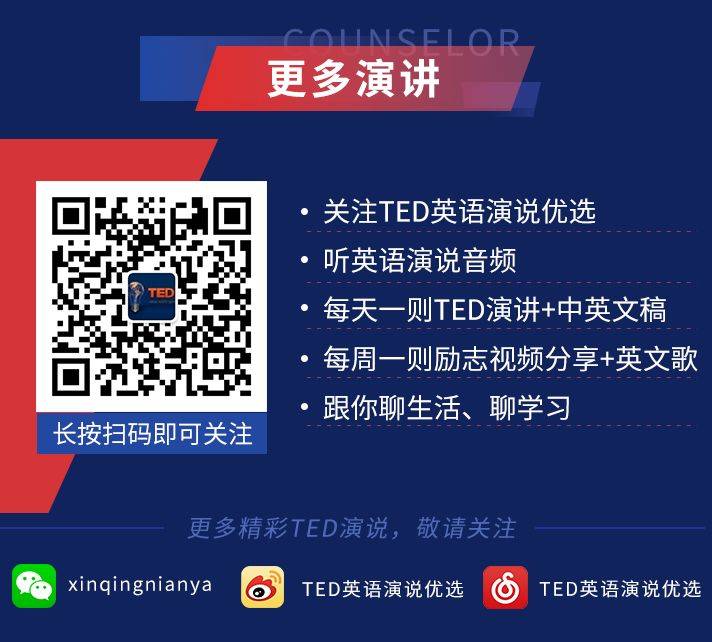
hello大家好,我是达达。沉默的一代,婴儿潮一代,X一代,千禧一代,Z一代,也就是大家常说的70后、80后、90后等,仔细想想,我们是不是总会带着一种有色眼镜去看待这些用年龄划分的人群?即使大家本质上并无多大的矛盾,但我们对彼此的偏见已经阻碍了我们更好地工作和交流。社会心理学家Leah Georges就用一场演讲展示了我们之间的相似之处,并提供了一些应对之策,让我们能在多代人的工作环境中更高效地工作。
演讲者:Leah Georges
演讲题目: How generational stereotypes hold us back at work
中英文对照翻译
So, for the first time in America's modern history, we have five generations interacting at work.
这是美国现代史上第一次,工作环境中有五代人共存。
The veterans, born between 1922 and 1943, are known as the Greatest Generation, the matures, the silents. They're known for their self-sacrifice, respect for authority and work as its own reward.
出生于1922-1943年间的老兵一代,他们是最伟大的一代、成熟的一代、沉默的一代。他们牺牲自我、尊重权威,以工作为荣。
The boomers came shortly after, born between 1944 and 1960. This is a generation characterized by hard work. In fact, we can thank this generation for the term "workaholic." They appreciate competition, they love effective communication. And they're thinking towards retirement, if they haven't retired already.
随后的1944-1960年,美国迎来了婴儿潮一代。这一代人工作勤奋。实际上,出现“工作狂”这个词还得感谢他们。他们注重竞争,喜欢有效沟通。那些还没退休的人则畅想着退休后的生活。
Generation X is known as the lost generation the latchkey generation, born between 1961 and 1980. This is the smallest generation, sandwiched between boomers and the big millennials. More parents were divorced in this generation than any generation prior. They also were the first generation to tell us about work-life balance, and the first to really ask for that in the workplace.
“X一代”也被称为迷惘的一代、挂钥匙的一代,他们出生于1961-1980年间。这一代人,人数最少,介于婴儿潮一代和庞大的千禧一代之间。这一代人的父母的离婚率高于此前的任何一代。他们也是第一代跟我们谈论要平衡工作与生活的人,同时也是第一代真正在工作中争取这种平衡的人。
And then millennials -- you know, the everybody-gets-a-ribbon generation -- born between 1981 and 2000. Never knew a time where technology wasn't present in the home. They're incredibly pragmatic, they're hopeful and they're determined. They think they're going to change the world, in fact, I believe they're going to do it.
“人人都披绶带”的千禧一代出生于1981-2000年间。他们不知道科技走进千家万户之前世界是什么样的。他们非常务实、怀抱希望、决心强大。他们认为他们能改变世界,事实上,我相信他们会去改变世界。
They might be a little bit idealistic sometimes, but in just the last several years, we've seen millennials overtake Generation X to be the most represented generation in the workforce. In fact, more than one in three people in the United States labor force is a millennial. And soon to join us there, Generation Z, born since 2000, our high school interns or soon to be high school graduates.
有时候,他们或许有点理想主义,但是就在前几年,我们看到千禧一代超越了X一代,成为了工作中的主力军。实际上,美国的劳动力,每三个人中就有一个是千禧一代。很快,又出现了Z一代,即2000年后出生的人,他们有些是高中实习生,有些很快将成为毕业生。
Now, if you open any internet browser, look at Amazon, search any of your favorite search engines, you might assume there's a literal war in the workplace, right? We see blog topics like "Seventeen reasons why millennials are the worst generation." And "Why baby boomers have ruined it for everybody." Or "Bridging the great generational divide."
现在,你随便打开一个 网络浏览器,看一下亚马逊,打开你喜欢的任一个搜索引擎,你或许会想,工作场所中有一场口水战正在上演,是吗?我们就会看到这样的博文话题:“17个理由说明为什么说千禧一代是最糟糕的一代”、“为什么说婴儿潮一代毁了大家的一切”、或者“消除代际分歧”。
It's like turning into this "West Side Story," like, boomers come in one door, millennials come in another door, the lobby, they just fight with each other all day, complain, go home, do the same, come back to work, right?
就像《西区故事》一样,就像婴儿潮一代从一扇门进来,千禧一代从另一扇门进来,他们成天扭打、互相抱怨、回家,相同的戏码反复上演,再继续工作,是吧?
Well, so what if I told you these generations may not exist? I've been spending some time thinking about this and researching this, and fellow researchers and I aren't exactly sure that these generations are real. And in fact, if we can agree that these groups even exist, we certainly don't agree who belongs in them.
那如果我告诉你这几代人或许都不存在,会怎么样?我曾花了一些时间来思考并研究这个问题,而我和其他研究成员并不确定,这几代人是否真的存在。事实上,就算我们都认为这几代人存在,我们也不确定谁属于哪一代人。
And they span something like 20 years. So at whatever point in history, a one-year-old and a 20-year-old are said to share the same value system, to want the same things at work, to have the same stereotypes working for and against them.
一代大概是20年。所以在历史长河中的任何一个时间点,一个1岁的孩子和一个20岁的大人都会遵循相同的价值体系、在工作中想要一样的东西、在工作环境中面临相同的模式化观念。
And in fact, different areas of the world define these generations differently. So we can't even compare generations across various areas of the world. And these stereotypes about each generation have, in a lot of ways, created this self-fulfilling prophecy, that people begin to act as if they're part of that generation because we've said out loud that generation is real. I'm not so sure that it is.
事实上,全球各地对每一代人的界定不尽相同。所以我们甚至无法比较全球各地的每一代人。这些关于每一代人的模式化观念在很多方面都创造了自证预言,即人们的行为举止似乎开始说明 他们是那一代人的一份子,因为我们明确地说了那一代人真实存在。我不敢苟同。
And in fact, this idea of generations has become deeply embedded in United States culture. When we talk generations, people know exactly what we're talking about. In fact, people have a lot of thoughts and feelings about each of these generations. And I'll tell you how I know this. I did the thing that every red-blooded American and pre-tenure academic does when they have a question.
实际上,这种一代人一代人的想法在美国文化中根深蒂固。当我们谈论一代人的时候,对方知道我们谈论的是什么。实际上,人们对每一代人都有很多的想法和感觉。我来跟你们说说我是怎么知道的。我做了一件每一个血气方刚的、尚未获得终身职位的美籍学者在遇到问题时都会做的事。
I Googled some stuff. And this is what I learned. Google is based on algorithms, and they provide you with commonly searched terms, or suggested hits, based on what other people are searching surrounding the same topic. And it gave me a really good sense of what people think about each of these generations. Take a look.
我在谷歌上搜索了一些内容。这就是我搜索到的内容。谷歌是按照算法运行的,会显示常用搜索词条、或者根据其他人就相同主题的搜索出现的查询结果。人们对每一代人是怎么看的呢?就此,谷歌真的让我有了很好的认识。一起看看吧。
I learned that baby boomers are conservative, that Americans think they're stupid. The worst generation, they're angry, apparently they're racist and they're so important. Looking at Generation X, I learned Generation X is a cynical group, they're angry, they're known as the lost generation -- we know this; they're the smallest generation. Apparently, they're stupid too.
我了解到,婴儿潮一代比较保守,美国人觉得他们很傻。他们是最糟糕的一代,他们愤愤不平,显然他们信奉种族主义,但是他们非常重要。接下来看看X一代,我了解到,X一代愤世嫉俗,他们愤懑不平,他们是迷惘的一代,人尽皆知;他们这一代规模最小、人数最少。显然,他们也很傻。
And mostly, they're frustrated with baby boomers.
在很大程度上,他们对婴儿潮一代感到懊恼。
Alright, millennials, this is what I learned about us. So, we're obsessed with food.
继续看,千禧一代,这是对我自己这一代的认识:我们沉迷于吃吃吃,无法自拔。
We're also stupid, ah! We're lazy, we're sensitive, we're fired, we're also hated, and we think we're important. And perhaps the most terrifying search result on the internet -- Generation Z is screwed.
还有,我们也很傻。我们很懒、敏感又玻璃心,我们被开除、被解雇,我们也遭人嫌遭人恨,我们还认为自己很重要。或许网上搜到的最糟糕的结果是——Z一代完蛋了。
OK, so, for five years, I've been talking to leaders and followers across a wide variety of organizations. And this is what I've come to realize. Generations haven't become part of the conversation -- generations have become the conversation at work. What I've learned is that we're working under the assumption that those Google results are true.
过去五年,我不断地与各个组织机构的领导及其追随者谈话。我发现了,一代又一代的人并没有成为我们的谈话核心,但他们却是工作场合中谈话的核心。我发现,我们正在假设上述谷歌搜索结果为真命题的情境下工作。
And so, what I think is that organizations are now desperate to figure out how to "manage" the multigenerational workplace. "Manage" it. We manage all sorts of things. We're preparing for this wave of millennials to come to work. So we prepare for hurricanes, right? We prepare to take the MCAT, we prepare for natural disasters. Why are we preparing for 23-year-olds to come to work?
所以我认为,各个组织机构目前特别想搞清楚要如何去“管理”多代人的工作环境。“管理”。我们什么都管。我们正在准备迎接一大波千禧一代进入职场。我们会做好准备防范飓风的,对吗?我们准备参加医学院入学考试,我们做好准备,应对自然灾害。一群23岁的人即将进入职场,只不过,为什么我们要做准备呢?
I've talked to these organizations, and I've heard amazing things that they're doing to create a workspace for everybody to get along and to have autonomy and to feel like they're thriving. But I've also heard some really incredibly harebrained ideas about how to navigate the multigenerational workplace. Are you ready?
我与各个组织机构谈话,我听说了他们所做的惊人努力,去打造人人都能和谐相处的工作环境,打造自主权,让大家觉得整个团队正在茁壮成长。但是我也听说了一些愚蠢至极的想法,关于管理多代人的工作环境。你们准备好了吗?
This is what I saw. I visited an organization, and they adopted this idea that if you can see it, you can be it. A really important concept. But I think they blew it. The put pictures on the walls of the ideal multigenerational workplace, because if you can see it, you can be it.
这就是我所看到的。我参观了一个机构,他们就采用了这个想法,即你能看到就能做到。一个非常重要的理念。但我们觉得他们没用对。他们在墙上挂了很多图,主题是理想的多代人工作环境,因为你能看到就能做到。
Or like this one.Like, I don't even want to work here.
或者像这个。我根本不想在这里工作!
You don't get to wear color here, apparently, and HR seriously has problems with people jumping in heels, I promise you that, OK? I talked to an organization who recently decided against putting a ball pit in the break room because that's how you retain millennials. We're 30, not three.
显然,在这里你不能穿鲜艳亮丽的服装,HR肯定对穿着高跟鞋还蹦跶的人不满,我打包票,好吧?我跟一个机构沟通,他们最近做出了决定,反对在休息室里放置海洋球,这是留住千禧一代的技俩。我们都30了,不是三岁小孩子。
And in fact, I know a young, at the time, millennial, who was told that if she wanted people to take her seriously, just because she was a millennial, she would have to do this -- wear shoulder pads. Yes. People younger than her and older than her wouldn't take her seriously unless she wore shoulder pads. Straight-out-of-the-80s, can't-even-buy-them-anywhere shoulder pads. This young woman had two graduate degrees. This young woman was me. And this is the best we came up with? How to navigate the multigenerational workplace ... is shoulder pads?
实际上,我当时还知道一位千禧一代,有人告诉她,如果想让别人把她当回事,就因为她是千禧一代,她就得这么做——用肩垫。就是这样。比她年长或比她年轻的人都不会把她当回事,除非她用肩垫。就算是80年代也买不到的那种肩垫。这位年轻女性拥有两个硕士学位。这位年轻女性就是我。这就是我们能想到的最好的解决方法吗?管理多代人的工作环境……要靠肩垫?
So, this is also what I've learned talking to organizations that employ a wide range of people of various ages. We are so much more similar than we are different. And we're hearing this consistently. People want work that matters, they want flexibility, they want support, they want appreciation, they want better coffee.
这是也我与各个组织机构交谈的发现,这些组织结构里有各个年龄层次的员工。我们的确有不同的一面,但我们有更多相似的一面。而且我们听到的也都是:人们想做真正有用的工作,想要自由灵活,想要获得支持,想要被欣赏称赞,想要更好喝的咖啡。
But none of these things are tied to a generation. Now, sure, we see small differences in what people want. We know 20-year-olds and 60-year-olds go home and do different things. They have different values. At least when it comes to things happening outside of work.
这些都不是只与某一代人挂钩的东西。我们确实会发现人们的追求有细微差别。我们知道,20岁的人和60岁的人下班回家后所做的事情不一样。他们有着不同的价值观。至少对于工作以外的事情是如此。
But I think what's happened is that this focus on generational cohorts, these groups of people, has created a space where we just forgot that people are people. And to know who they really are, who we really work with, we have to figure out how to better navigate this multigenerational workplace than ball pits. Call me one of those idealist millennials, but I think we can get there. And I don't think the idea is too terribly difficult.
但是我认为,对一代人的关注,对一代又一代人的关注,打造了这样一个环境——我们忘了大家都是人。为了知道他们到底是谁、我们到底在和谁一起工作,我们得搞清楚如何更好地管理这个多代人的工作环境。可要比管海洋球管得好啊!你们可以说我是千禧一代中的理想主义者,但我相信我们能做到。而且我也不觉得这个想法很难实现。
What if we radically, simply, not easily, meet people where they are? Individualize our approach. I've never met a generation. I've had a lot of conversations with people who happened to identify with a specific generational cohort. I met. I know that 80-year-olds text message and 23-year-olds crochet blankets. None of these things are stereotypical of that generation, right?
如果我们从根本上、单纯地、而非简单地去认识一个人,那会怎么样?因人而异。我未见过特定的某一代人。有些人恰巧与特定的某一代人产生了共鸣,我与他们进行过深入的交谈。我了解得更多了。我认识知道怎么发短信的耄耋老人,也认识会织毯子的年轻人。但是这些并不是那一代人的典型特征,对吧?
Nilofer Merchant -- she's a thought leader in innovation -- she tells us we have to meet people in their onlyness, that is, that spot in the world where only we stand, as a function of our unique history, our experiences and our hopes. But this requires flexibility and curiosity.
Nilofer Merchant是一位创新思想领袖,她告诉大家,我们得去认识人们的唯一性,也就是我们在世界上的唯一处境,这是我们独特的历史、我们的经历、我们的希望造就的结果。但这需要灵活应对、要有好奇心。
And what happens when we meet people in their onlyness, only the spot in the world that they stand, we learn that that boomer who is just acting "angry" at work all the time is scared. Because he's worked every day since he was 16 years old, and on a Monday, sooner than he can imagine, he'll never go to work again. He's got plans. It's going to take like a week and a half to do all the things on that retirement list. But then what? What if we give a little bit of grace to the person that might be a little scared?
当我们去认识人们的唯一性时,去认识他们的处境时,我们会明白,在职场中一直表现出“愤愤不平”的婴儿潮一代的某个人,其实内省充满恐惧。因为他从16岁开始就每天工作,而某个他还来不及做好心理准备的周一, 他就不用再去上班了。他有自己的计划,那就是花一周半的时间 把退休清单上的所有事情都做完。但是,在那之后呢?如果我们能给那个心怀一丝恐惧的人多一点的时间,会怎么样?
Or that Generation X-er who has four drop-offs, three kids, two hands, and is just trying to keep the wheels on the bus. Sure, maybe she's a little aloof at work. Maybe she's a little independent, maybe she's exhausted. Or that millennial who asks for a raise after two months because they're "entitled?"
或者,X一代的某个人,她辍学四次,有三个孩子,只能通过自己的双手努力给家人好的生活。当然,她可能对工作有些漠不关心,她可能有点无依无靠,她可能累坏了。又或者,千禧一代的某个人,工作两个月后就要求加薪关于职场的演讲稿,因为他觉得自己“值得拥有”?
Well, maybe it's because that generation has more debt than any generation before them, coming out of college, and they just need the money to keep going, to pay rent.
这可能是因为这一代人在大学毕业后比此前的任何一代人有更多的债务,他们只是需要钱来维持生活,付租金。
And suddenly, when you meet people in their onlyness, that spot in the world only they stand, we're not talking about a generation anymore. We're talking about Jim or Jen or Candice. And so here's my challenge to us. Pick a person, just one, and explore their onlyness. And then learn. And then in the moments where it's appropriate, teach.
突然,当你去认识人们的唯一性时,当你去了解他们的唯一处境时,那我们谈论的就不是某一代人了,我们谈论的是张三、李四或王五。我现在向大家发起挑战,选择一个人,就选一个,然后去探索他的唯一性。去了解他们。在合适的时候去沟通,教育。
And figure out what they bring to work that no one else can bring to work, because that's what makes work richer. And then do it again. And do it again. And then some day, we're not working with generations anymore. We're working with people.
去看看他们为工作带来了什么,是其他人没有的,因为这才是让工作更丰富多彩的关键所在。再寻找下一个目标。再寻找下下个目标。某一天,我们就不再是与某几代人一起工作了。我们是与具体的一群人一起工作。
And so to really understand the beauty of the multigenerational workplace, I think we just have to meet people where they are. And that doesn't require that we unpack and live there with them. But we might find, at least on occasion, it's a beautiful place to visit. And so I think there's just no need to argue about which generation is the most angry or the most entitled or the most so obsessed with food.
所以要想真正了解多代人一起工作的好处,我觉得我们要去了解人们的处境,这不是要我们去跟他们住在一起关于职场的演讲稿,但是我们可能会,至少时不时地会发现,这个地方很美好,值得一去。所以我认为真的没有必要去争论哪一代人最愤愤不平,哪一代人最自以为是,或者哪一代人最爱吃吃吃。
We all come to the classroom, to work, back to our homes, a little bit tired and a little bit tattered sometimes. Maybe let's just do our best to humbly meet people where they are, how they show up that day, generation and all. And in those moments where it can feel a little bit like intergenerational warfare, I think we can at least all agree that shoulder pads aren't the solution.
我们都要上学、工作、下班回家,我们都会有点累,有时会有几分不堪。那就让我们尽可能谦逊地认识他人吧,认识他们的处境,同一代人也好,其他代人也罢。这样的话,在代际间的斗争初露端倪时,我想我们至少都赞同用肩垫解决不了问题。
Thank you.
谢谢大家。
Remark:一切权益归TED所有,更多TED相关信息可至官网查询!
好消息又来啦!达达最近开通了视频号,欢迎你们识别二维码关注哦~我会发一些一分钟的小视频,可以提高听力又能锻炼口语,来玩吧!

PS:为了能帮助到更多小伙伴,我还开了新个人微信号▼
ID:NiceNINE81
欢迎小伙伴们加我好友,一起交流学习呀!
期待与你相遇,不见不散▼
你说你喜欢雨,但是你在下雨的时候打开了伞
你说你喜欢风,但是你在刮风的时候关上了窗
这就是为什么我害怕你说你也喜欢"英语"
因为你连"TED英语演说优选"都没关注...




